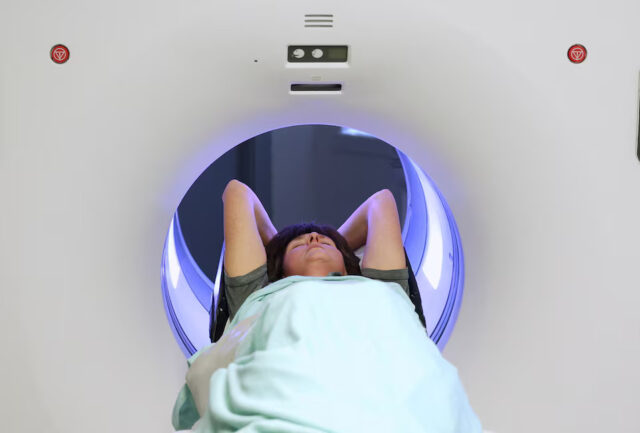
At London’s University College Hospital, the nuclear medicine department uses advanced technology with radioactive tracers to treat cancer, providing a model for Prime Minister Keir Starmer’s plan to revitalize the NHS.
This initiative aims to boost employment and counter the rise of Nigel Farage’s Reform UK party, with Starmer promoting his “reform or die” agenda for the health service.
His team sees the NHS in England as one area where it can offer people tangible improvements soon, a member of his team said.
So, it’s in hospital corridors such as these, where political rhetoric meets practical reality, that votes for Starmer’s Labour Party could be won or lost as his health reform agenda is tested in local elections in parts of England on May 1.
Ahead of last year’s election, public satisfaction with Britain’s struggling NHS hit a record low, with nearly half of Labour’s supporters citing its improvement as their top priority. In its October budget, Labour allocated 26 billion pounds ($34 billion) to the NHS over two years, the largest increase since 2010, while also cutting welfare spending to meet fiscal rules.
It said the NHS must start reducing waiting times and take steps to cut bureaucracy and red tape, including scrapping NHS England, an organisation that manages health services.
Starmer aims to double the number of scanners in England to reduce the 6-million-person treatment backlog and add 2 million extra appointments annually.
The NHS met its appointments target from July to November 2024 and is making progress on the waiting list. However, the sustainability of these efforts, especially in less affluent areas where Farage’s support is growing, will be a key test.
“When you ask those who switched to Labour at the last election, it was very clear that the NHS and the economy were the two key tests as to whether Labour have delivered on their promise,” said Luke Tryl, executive director of think tank More in Common UK.
Farage To Exploit NHS Discontent?
Farage, whose party has rivalled the popularity of Britain’s two main parties in recent weeks, hopes to win votes in central and northern England and the nation’s increasingly deprived coastal areas, where dissatisfaction with the NHS runs deep.
Reform UK did not respond to a request for comment for this story but has argued it could eradicate waiting lists by reducing NHS managers, boosting the workforce and offering private healthcare vouchers.
Health Minister Wes Streeting, who said in January that improving the health service would be a “potent antidote” to populism, says this shows Farage does not believe in the NHS’s mandate of “a universal service free at the point of use” – which Farage rejects.
For one health expert, Starmer’s strategy is a gamble because it will take longer than May for the benefits of Labour’s extra spending to be noticed by voters.
“The problem with investment in health is that it is notoriously quite sticky, it takes a while to see noticeable benefits,” said Luke Munford, senior lecturer in health economics at The University of Manchester.
A spokesperson for the Department of Health and Social Care said: “We have hit the ground running.” Besides delivering the extra appointments, the spokesperson said the government had invested in family doctors to shift care out of hospitals and diagnostic equipment to get patients answers sooner.
Progress
Labour plans three major shifts for health: to move care from hospitals to the community, switch treatment and administration technology to digital methods, and work on methods of prevention rather than just treatment – hence the publicity focus on scanners.
At the London hospital, staff face challenges like expensive scanners and a shortage of skilled workers. Demand is rising as the aging Baby Boomer generation requires more care. While the hospital has increased scan rates and streamlined procedures, it lacks space for new machines and struggles to recruit trained radiographers due to insufficient training in the UK.
The hospital’s scanning services often fail to generate enough revenue to cover their costs. To address this, it is exploring bulk procurement, income generation, and private partnerships, according to David Probert, CEO of University College London Hospitals trust.
As well as finding enough investment, hospitals need to bring “the population with you,” Probert said: elderly people, for instance, often struggle with online services.
He said that every year he tells his staff the next one is going to be “incredibly challenging. And now I’m saying it again: The next year will be incredibly challenging.”
Political Challenge
Reform is targeting eastern Lincolnshire, an agricultural area where Andrea Jenkyns, a former Conservative MP, is running for mayor. Reform aims to address local frustration with high immigration by promoting a policy to freeze non-essential immigration, which Farage claims contributes to NHS waiting lists.
Derek Ward, Lincolnshire’s public health director, noted that the region’s population over 85 is expected to nearly double by 2043, with growing long-term health needs. Health economist Munford stated that deprived areas like Lincolnshire have been hit harder by government cuts to preventative health, leading to worse health outcomes and a loss of faith in government promises for new hospitals.
“Austerity was the perfect storm in deprived areas,” he said. “The obvious thing to do is to blame the status quo, the government.”
The government said its extra funds are weighted towards poorer areas: “We are ensuring the NHS is fit for the future while taking immediate action to improve patient care,” its spokesperson said.
($1 = 0.7724 pounds)
(With inputs from Reuters)




